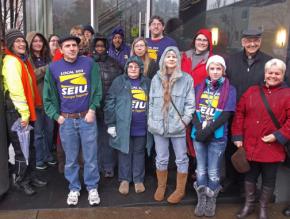A hard loss at Bethesda
reports on the outcome of a union drive at Bethesda Lutheran Communities.
AFTER A long campaign, direct-care workers at Bethesda Lutheran Communities who support adults with developmental disabilities lost their vote to be represented by a union.
The workers were organizing with Service Employees International Union (SEIU) Local 503, and had submitted authorization cards to the National Labor Relations Board.
Bethesda Lutheran Communities led a well-financed, vindictive, anti-union campaign from the very start. With easy access to workers via work e-mail, anti-union fliers all over the place, and workers worried about being seen supporting the union, management was able to create an intimidating atmosphere. In the end, only half of the people who originally signed authorization cards voted in favor of union representation.
There were employee homes that union supporters were never able to get to, so the workers in those homes only heard management scare stories. The behavior of management astonished even seasoned union workers.
Bethesda management, along with highly paid anti-union lawyers, went around to the various group homes in the Portland area and had a captive audience. Small groups of workers were forced to endure management's anti-union pitch. Key union supporters were excluded from these meetings.

Management portrayed the union as an outside body that was only interested in dues. They didn't, of course, want to talk about the grievances that led to workers getting in contact with the union.
DESPITE THE fact that management created an atmosphere of fear and intimidation, it didn't stop union supporters from being active.
At least four union supporters also have been put on unpaid administrative leave, leading to pending unfair labor practices complaints.
Workers will now have to carry on with extremely low pay and lack of adequate benefits. This leads to increased turnover of staff, which of course will have an adverse effect on the lives of the people we support.
During the course of the campaign, two bills backed by SEIU Local 503 to expand the rights of people with developmental disabilities were going through the Oregon State House. Union supporters who worked at Bethesda testified at the hearings for the bills. A lobbyist from the Oregon Rehabilitation Association--a coalition of provider companies, including Bethesda--lobbied against the bills. Was it just a coincidence that, after testifying, the workers were put on administrative leave?
In a letter to its supporters, SEIU wrote, "Unfortunately, Bethesda management chose to create an environment so hostile that we were unable to win our vote. We will move forward with our Unfair Labor Practice charges as a challenge to the conduct of the vote as we believe it was impossible for a fair vote to occur under the circumstances created by management."
The union will have to seriously look at how the campaign was run and what lessons can be learned if we are going to rebuild our efforts. Among other things, the union talked about being "partners" with Bethesda to improve the lives of people we support--but management has clearly shown that it has no interest in what workers have to say.
We who are on the front line will continue to deliver first-class support for some of the most oppressed people in society, but it's only through our collective strength can we hope to win a living wage and thus a stable workforce.
We may have lost this vote, but as far as we are concerned this is not the end of the story. Our working conditions are the living conditions of the people we support--so we will carry on for the benefit of both.


